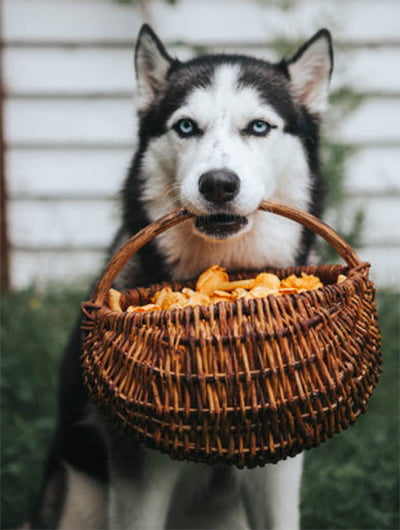Mushrooms grow just about everywhere, so whether your dog stays strictly outside or comes across them on a trail walk, there's a chance for your dog to take a bite of them. Mushrooms also aren't typically a favorite food of children, so it's entirely possible a couple of mushrooms might get sneakily passed under the table to the family dog that's more than happy to take care of scraps. But can dogs eat mushrooms? Are they safe for dogs?
Can Dogs Eat Mushrooms?
In general, yes - dogs can eat mushrooms, at least the store-bought mushrooms. If a mushroom variety is safe for humans, it is safe for dogs. So what kind of mushrooms can dogs eat? Here are some grocery store varieties:
White button
Shiitake
Porcini
Cremini (and, by extension, portobello)
That being said, cooked mushrooms are typically added to dishes with large doses of salt, butter, onions, and garlic. All of those ingredients can upset your pet's stomach, and it's best to feed your dog plain mushrooms or raw mushrooms when possible.
Can Dogs Eat Cooked Mushrooms
Yes, a dog can eat cooked mushrooms as long as it is identified and brought from the store. Ensure there are no other added ingredients in the cooked mushrooms, including salt, seasoning, or other vegetables that can be toxic to dogs.
Health Benefits of Eating Mushrooms For Dogs
Mushrooms are some of the most nutritious foods you can add to your dog's diet. They are full of:
Prebiotics
Vitamins (B6, folate, riboflavin, and pro-vitamin D)
Minerals (copper, zinc, iron, selenium, manganese, and lysine!)
Healthy fats and proteins
Antioxidants
One important caveat, however, is that all of these nutrients are contained in tough cell walls. Cooking breaks this wall down, but otherwise, raw mushrooms won't have much accessible nutritional value for your dog.

Can Dogs Eat Wild Mushrooms?
Many people follow the rule of thumb to not eat any wild mushroom that they can not identify with certainty. Not all mushrooms are safe for humans and dogs to eat. There are apps to help you identify wild mushrooms, but a few toxic mushroom species look very similar to safe mushrooms. It's a good idea to avoid letting your dog eat any wild mushrooms in case it is poisonous mushrooms.
However, if you are adept at identifying mushrooms, many are safe. Some are truly nutritional powerhouses. Others, called medicinal mushrooms, contain a specific polysaccharide that shows promise in treating cancers. Some wild mushrooms that are beneficial to your dog are:
Turkey tail
Lion's mane
Cordyceps
Maitake
Shiitake mushrooms
Chaga
Reishi
Phellinus
Remember never to feed your dog mushrooms unless you know that it is safe for consumption. Only a small percentage of wild mushrooms are toxic, but the reactions from eating them can be severe.
The Downside: Mushroom Poisoning
The concern comes with eating mushrooms that you haven't properly identified. Mushroom poisoning can present in various symptoms, depending on the type of poisonous mushroom eaten and any of your pet's underlying health conditions.
Some common symptoms of mushroom poisoning in dogs are:
Digestive: diarrhea, vomiting, excess salivation, abdominal pain
Movement: uncoordinated movements, tremors, lethargy, weakness
Liver failure
Coma
Seizures
Death
If your dog eats a wild mushroom that you aren't sure what it is, it's best to get it out of its mouth as soon as possible.
Treating Mushroom Poisoning
If you suspect that you are dealing with mushroom toxicity, you need to immediately bring your pet to a veterinarian. If possible, bring a sample of the toxic mushrooms your dog ate to help narrow down a course of treatment.
There are many ways to treat mushroom poisoning in dogs, but the first step is usually to induce vomiting to purge the toxins from your pet's body. Activated charcoal can be used to bind the toxins and help them pass out of the digestive and circulatory systems. Medications to protect and support the liver will likely be prescribed.
Allergic Reactions
Some dogs may react even to safe mushrooms. While not mushroom poisoning, any allergic reaction is something to take seriously. Common symptoms of a food allergy are:
Excessive gas
Vomiting
Hives
Difficulty breathing
Swelling around the face
Some food allergies present in a short-term reaction, but others can be more serious. Bring your dog to a veterinarian if the food allergy is severe.
How To Prevent Your Dog From Eating Wild Mushrooms
Unless you are an avid mushroom hunter and can solidly identify any wild mushroom, it's best to keep your dog from eating any. Easier said than done? Here are some tips to try:
When taking walks, stay away from wooded or damp areas.
Use a basket muzzle during walks if your dog is prone to scavenging.
Immediately remove any mushrooms that pop up in your yard.
Train your dog to respond to "leave" or "drop" commands.
How To Safely Feed Mushrooms To Your Dog
Mushrooms are filled with nutrients, but they should be prepared in a certain way to be most beneficial for your dog. And always introduce new foods into your pet's diet slowly to watch for allergic reactions and stomach upset.
Both fresh mushrooms and dried mushrooms have more nutrients than canned mushrooms, but you should always cook mushrooms before feeding them to your pet. A dog's digestive system lacks the enzymes necessary to break through the chitinous cell walls of mushrooms, and cooking mushrooms will break down those cells and make the nutrients available.
Here's the best way to go about that:
Wash the safe, edible mushrooms thoroughly.
Slice the mushrooms, keeping in mind that small dogs will need smaller slices.
Heat olive oil, or another dog-safe cooking oil, in a pan.
Saute the sliced mushrooms for a few minutes.
Stay away from adding salt or seasonings, but feel free to add some beef or chicken broth for increased flavor.
You can serve cooked mushrooms to your dog on their own or mix them with their regular dog food.
